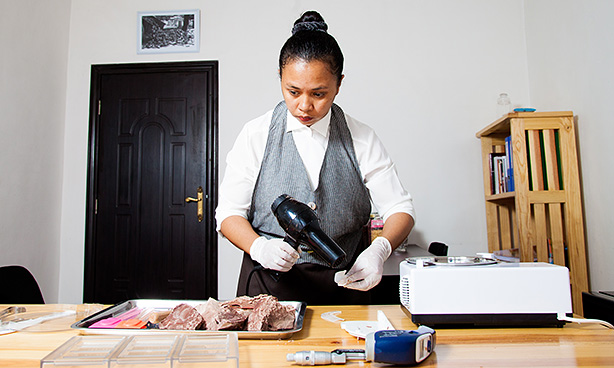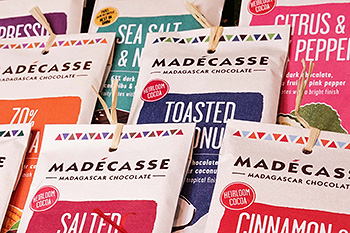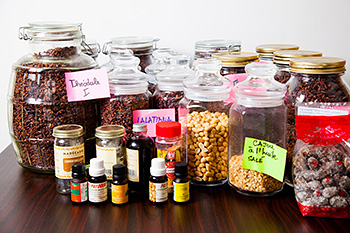
Fanjaniaina (Razafimbelo) Fawbush, Ph.D. '09, a research and development manager for Madécasse Chocolate & Vanilla, works in the company's lab in Madagascar. Photo: Madécasse.
Cornellian takes skills to Madagascar's chocolate industry
Before Fanjaniaina Fawbush, Ph.D. '09, came to Cornell, she dreamed of working for Chocolaterie Robert, one of a few chocolate factories in Madagascar, but openings there were rare.
Now back in Madagascar after completing her doctorate on post-harvest preservation of fruits and vegetables, she has come full circle as a quality control and research and development manager at Madécasse Chocolate & Vanilla, a company based in Brooklyn, New York, and Antananarivo, Madagascar, that was launched in 2006 by two Peace Corps volunteers who served in Madagascar.

Some of the premium chocolate bars from Madécasse, which makes chocolate from "bean to bar" in Madagascar and sells its products in the United States and Europe. Photo: Madécasse.
Fawbush, who used her maiden name of Razafimbelo at Cornell, credits her course work in horticulture, food science, and biological and environmental engineering with giving her the skills to study the cocoa industry and become a chocolatier at Madécasse, which she joined in February.
"The courses and the teachers and the way the courses were designed at Cornell helped me a lot because they provided the right approach and the tools necessary to help in my chocolate-making on this scale at Madécasse," says Fawbush, who is also an associate professor at the University of Antananarivo, where she teaches biochemistry, food chemistry and new product development.
"I had to order all the equipment and make the lab from scratch, and then make chocolate for the first time, and it had to be a bar that was very good," she says. "I was pretty happy with it. I did research prior, but all the background and approach was from the [Cornell] training."
Fawbush notes that she learned a great deal about sensory evaluation of food from Harry Lawless, emeritus food science professor; new product development from Joseph Hotchkiss, emeritus food science professor; and preservation of fruits and vegetables from her Ph.D. adviser, Chris Watkins, professor of horticulture and director of the Cornell Cooperative Extension. With Watkins, Fawbush says she learned about growing and postharvest treatment of apples -- skills, knowledge and research approaches that she applied directly to cocoa. This background helped her manage postharvest treatments and quality control when it came to making chocolate, she said.
Fawbush started at Madécasse after one of the founders, Tim McCollum, emailed her through a mutual friend from Cornell.

Some of the ingredients used in Madécasse's chocolates, which are made from an heirloom Criollo cacao plant that only grows in northwest Madagascar's climate and soil. The company helps protect the genetically distinct cacao plants by training farmers in sustainable farming. Photo: Madécasse.
"Tim contacted me directly," says Fawbush. "They needed someone who could communicate in English and had a food science background." Fawbush also understood both the U.S. market and the culture of Madagascar.
After McCollum and co-founder Brett Beach completed their Peace Corps terms in Madagascar, they wanted to give back. They decided to make premium chocolate in Madagascar and use the business to provide more than 200 jobs, help set up farming cooperatives, train farmers to think like business people and protect Madagascar's fragile, genetically unique cocoa trees through sustainable farming.
Madécasse is the only U.S. company that makes chocolate "bean to bar" in Madagascar, then sells its products in the United States and Europe.
Madécasse's premium chocolate benefits from an heirloom Criollo cacao plant that only grows in the climate and soil found in northwest Madagascar's Sambirano region. Madécasse farmers have started the world's first ancient Criollo tree nursery to grow and preserve this special strain. For this purpose, experts have come to teach Fawbush how to recognize which trees will bear the best cocoa for making fine chocolate.
Fawbush says she took the job with Madécasse because they wanted to start a business that solved problems, nurtured a partnership approach to business and empowered people, which fit well with Fawbush's personal ethics and ideals.
In Ithaca, "we were solving problems that were needed by farmers and industry and not just pursuing research for the sake of research," she says. "We built up practical knowledge, but to solve problems."